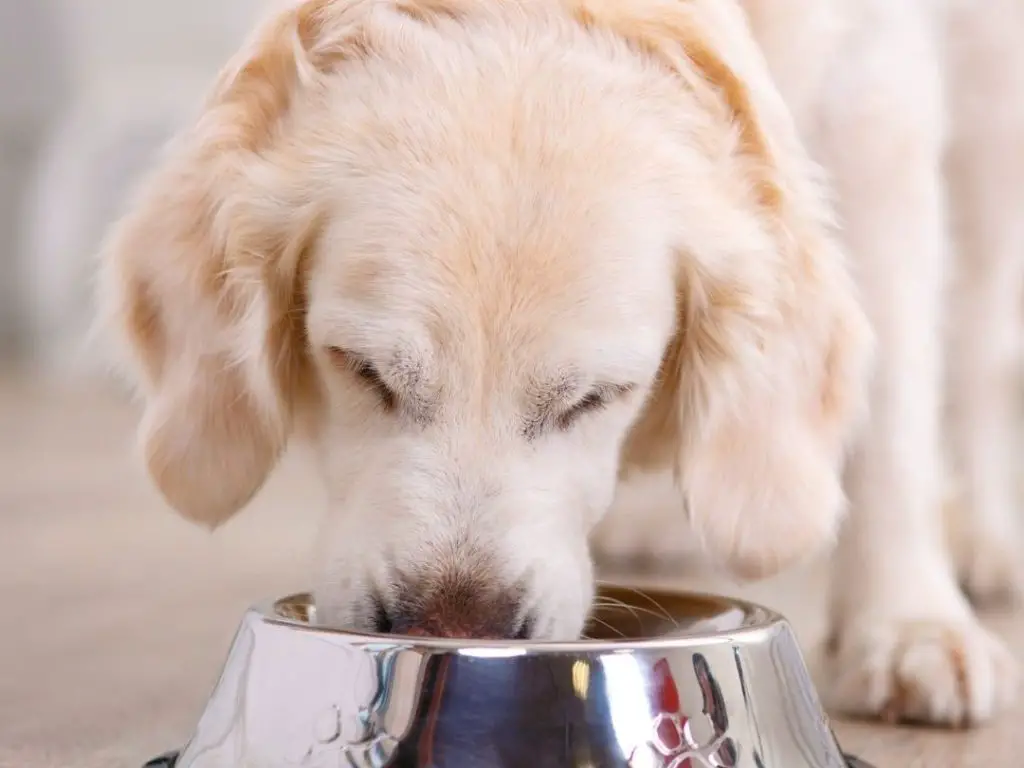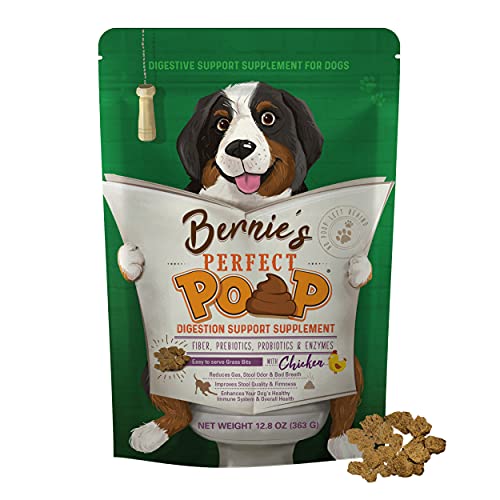I wondered ‘How many days can a dog go without pooping?’ when my pet Cocker Spaniel – Coco – refused to poop for two consecutive days.
She had had two or three bowel movements when we took her for a weekend getaway. After we got back, she simply refused to eat and wouldn’t poop too. Thankfully, the matter was resolved on the third day after she ate and her digestion was back on track.
Good dog poop means good health – all dog owners know that. A dog that poops regularly is (usually) a healthy dog.
Let us find out the answers to – how many days can a dog go without pooping? – and more importantly, when to see a vet.
How Many Days Can a Dog go Without Pooping?

A healthy dog will have at least one or two bowel movements every day.
Puppies eat several meals on a daily basis, have rapid metabolisms, which is why they a poop a lot more than adult dogs.
An adult dog also ideally poops at least once daily. Small dog breeds with small tummies might sometimes poop more often compared to the larger breeds. It also depends on the dog’s diet of course, so there aren’t any hard and fast rules.
Thankfully, our dogs are equipped with self-regulating digestive tracts. They might have several bowel movements on one day and none for the next day or even two days.
This is okay. As long as your pet is eating, sleeping, and acting normal, there shouldn’t be any cause for concern.
However, if the ‘no-poop’ spree continues on the third day, please see your vet right away.
What are Some of the Reasons Why a Dog Can Go Without Pooping for Several Days?

Here are some of the main reasons why your dog might refuse to poop for a day or a couple of days:
1. Health issues
Health issues –especially constipation – can stop a dog from pooping daily.
Just like humans, dogs can get constipated if their diet has no fiber or roughage in it. Canine constipation can also occur due to underlying health issues like obesity, intestinal blockage, etc. If a dog does not eat normally or skips its meals, then too it could suffer constipation.
However, even a constipated dog will poop but its stools may be very hard and dry. Dog stool consistency is ideally supposed to be small, dry, and not-too-soft. But a constipated dog might have very dry and hard stools and the affected dog might strain a lot while pooping.
Sometimes, swallowing objects can also stop a dog from pooping. The foreign object might get stuck in its intestines causing a blockage in the digestive tract.
Health issues like tumors, perianal hernia, and prostatic enlargement can also lead to severe constipation and irregularity.
2. Age
An older dog is more likely to be constipated or have irregularity as compared to younger dogs. Young dogs move and exercise more and also eat more number of meals. An older dog might sleep all the time and may not eat much. This could result in constipation.
3. Dehydration
In addition to eating well, a dog also needs to drink enough water to prevent getting constipated. Make sure your pet has fresh drinking water available at all times.
4. Inadequate activity/exercise
A couch potato or a lapdog can also go without pooping for days. A dog needs exercise to stimulate its bowels and without activity, it can have sluggish digestion and irregular bowel movements.
That is why you need to exercise or walk your dog so that it can get an opportunity to clear out its bowels.
5. Change in routine
My dog does not poop when we take her to a new place and even after we return from a long road trip. She might go without eating for a day or two and only spend all the time sleeping.
A change in routine is often a trigger for her to go without pooping for two whole days.
6. Stress
Sometimes, stress can also cause your dog to not poop for a while. If there has been a major change in your/your dog’s routine, such as moving to a new place or another pet in the house, then it might skip meals and not poop for a couple of days.
7. Eating grass
Is your dog in the habit of eating grass? Then it might have vomited afterwards and that too could be the answer to ‘How many days can a dog go without pooping’.
My dog does that. She eats grass and regurgitates it . Following this grass-eating spree, she won’t poop for a couple of days.
How Many Times a Day Should a Dog Poop?

There are no fixed rules here.
How often a dog poops depends on its age, diet, and activity levels.
Most dogs poop between one and five times a day. A vast majority of dogs go number two twice a day – once in the morning and once in the evening. Some dogs only defecate once a day.
In all of these cases, there is nothing normal or abnormal. Every dog is different and will have different number of bowel movements on a day-to-day basis.
How Does a Dog Act When it is Constipated?

The most obvious sign of canine constipation is lack of bowel movement. In addition, your dog might show the following signs:
- Skipping meals
- Straining to poop
- Blood in poop or bloody discharge from anal area.
- Impacted anal glands
- Bulge on the side of the rectum
- Scooting
- Circling frequently in one spot, sniffing
- Crying while pooping.
- Panicking while having bowel movement
- Licking the anal region
- Stools may be dry, small, and thinner than usual
What is a Natural Laxative for Dogs?

Many foods work as a natural laxative for constipated dogs:
1. Flaxseeds
Flaxseeds are a natural laxative as they are rich in fiber. Add powdered flaxseeds to the pet’s food to keep it regular.
2. Psyllium husk
Psyllium husk is a well-known human medicine for relieving constipation. It helps the stools pass out of the system with ease. Add a small quantity to your pet’s diet.
3. Slippery elm
Add a few drops of alcohol-free slippery elm tincture to your pet’s drinking water to naturally stimulate your pet’s bowel movements.
4. Milk of Magnesia
This is another common natural remedy to treat constipation in dogs. Give Milk of Magnesia as prescribed by your vet to keep your buddy regular.
5. DIY natural laxative
Make a natural laxative for your dog with the following ingredients:
- Raw oatmeal
- Honey
- Olive oil
Mix all the ingredients to make a paste. Feed it to your dog to relieve constipation naturally.
How to Stimulate a Dog to Poop?

Following are some of the best ways to stimulate a dog to poop:
1. Feed it pumpkin
Pumpkin always does the trick for my dog. I feed her a tablespoon of freshly pureed or canned pumpkin once a day when she ‘can’t go’. The next morning, she is clear. Regular pumpkin consumption is great for dogs with chronic constipation.
2. Feed it fig paste
Fig paste is also very high in fiber like pumpkin. Feed some fig paste over your dog’s kibble to stimulate it to poop.
3. Feed it canned dog food
For many dogs, eating kibble can be one of the common causes behind constipation and irregularity. Instead, switch to canned dog food as it contains more moisture and could stimulate your dog’s digestive tract.
4. Give it a bath!
Yes, for many dogs, warm water over the tummy and on the anus can encourage a bowel movement. Spray some warm water on your pet’s ‘under-the-tail’ area to stimulate it to poop.
5. Walk/exercise
Take your buddy out for a walk. Walking or jogging will stimulate and encourage a bowel movement and keep your dog regular.
6. Use pet wipes
Using pet wipes, wipe in circular motion around your dog’s anus. This will stimulate its bowels and make it go potty.
7. Ice cube method
Use this as the last resort to stimulate your dog to poop. Hold an ice cube around your dog’s bum and press gently on the anal region for 15 to 20 seconds. The cold sensation will cause it to poop right away.
What Supplements Can Relieve Canine Constipation?
1. NaturVet Stool Ease

NaturVet Stool Ease supplements contain beet pulp, flaxseeds, and psyllium husk – the natural laxatives we can rely on. It also contains pumpkin powder and dandelion root powder.
The National Animal Supplement Council has given this supplement its seal of approval and veterinarians have created this enzyme blend for dogs – so you can trust it blindly.
2. Bernie’s Perfect Poop Digestive Pre and Probiotic Health Supplement

Bernie’s Perfect Poop supplement is a 4-in-1 formula with fiber, prebiotics, probiotics, and digestive enzymes. These work to relieve gas, bloating, constipation, stool issues like foul odor and irregularity in dogs.
It contains miscanthus grass, pumpkin, and flaxseeds which naturally stimulate the bowels and keep your dog regular.
It even contains 1 billion CFU per serving of bacillus bacteria that improve gut microflora and regulate stalled digestion.
- HEALTH STARTS IN THE GUT: High Fiber Grass Bits naturally revitalize your pet's digestive tract to relieve digestive issues including diarrhea, constipation, upset stomach, stalled digestion, bloating and food intolerance; Reduces gas, stool odor, bad breath and firms up poop
- HELP YOUR DOG FEEL THEIR BEST: Bolster your dog's immune system and overall health; Increase absorption of nutrients and vitamins to help tackle common pet concerns such as allergies, skin, coat, itching, licking, infection, low energy, weight loss, mood, sensitive stomach, and more
- COMPLETE 4 IN 1 FORMULA: Combines premium Fibers, Prebiotics, Probiotics and Enzymes to supercharge your pet's digestive system. These four building blocks unite to form a high fiber solution that heals and maintains your dog's gut
- 4 IN 1 FORMULA SAVES TIME AND MONEY: Stop buying separate supplements; save time and money by buying one solution that combines them all; Solid grass bits mix in well with your dog's food or can be served as treat or topper; No more powders stuck at the bottom of the bowl or floating in the air like other brands; Serving size varies based on weight - One bag will last a 50 lb dog a little over a month
- NATURAL PREMIUM INGREDIENTS: Natural, Grain Free, Gluten Free, Non-GMO and Made in USA; Miscanthus Grass, Pumpkin Powder and Flax Seed Fibers provide the perfect poop; Inulin & Xylooigosaccharides Prebiotics; Bacillus Subtilis and Bacillus Coagulans probiotics support a healthy digestive tract and immune system; Blend of digestive Enzymes break down food and increase nutrient absorption
How to Know if a Dog Has an Intestinal Blockage?

An intestinal blockage can occur when a dog swallows stones, rocks, clothing, pins, buttons, raw hide treats, etc. Cooked bones can also shatter and cause intestinal blockage. Tumors are also one of the causes of this condition.
These factors can restrict the passage of bowels and make the dog constipated. Sometimes, the logged in objects can also cause intestinal perforations.
A dog with an intestinal blockage could show the following signs:
1. Vomiting and/or diarrhea
A dog with an intestinal blockage might regurgitate or vomit frequently. Some dogs also suffer from diarrhea or loose/watery stools.
2. Weakness
Repeat vomiting can result in loss of appetite which could result in weakness and lethargy.
3. Dehydration
Since the pet cannot retain water it could become very dehydrated. Its gums will be pale and it might not urinate much.
4. Abdominal Pain
A dog with an intestinal blockage could also suffer from abdominal pain and might hunch over to try and prevent the pain.
5. Bloat
Intestinal blockage can also result in bloat or gastric dilation volvulus. This is a serious issue that might need surgery for
If you suspect your dog has an intestinal blockage, please see your vet. Your pet needs to be X-rayed to see if there are any foreign objects or tumor causing the blockage.
FAQs on How Many Days Can a Dog Go Without Pooping?
1. What should I do if my dog hasn’t pooped in 4 days?
4 days is too long for a dog to go without pooping. Please see your vet right away.
2. Should I feed my dog if it is constipated?
You can feed your dog canned pumpkin as it is known to regulate and stimulate the bowels. You can also feed your pet some canned dog food or bland food if it has an appetite.
3. Can I give my dog milk for constipation?
You could feed a small bowl of cow or goat milk to your dog if it is constipated. Milk gets things moving and could relieve constipation. Make sure your dog is not lactose intolerant before using this natural remedy for canine constipation.
Conclusion
How many days can a dog go without pooping?
A dog could go without pooping for a couple of days. If it goes longer without a bowel movement for than 48 hours, it might be a good idea to talk to your vet.
You can try feeding your dog some canned dog food or canned pumpkin to stimulate it to poop. Also, walking or running with your pet can help keep it regular.
We hope this guide helps you relieve dog’s constipation.



